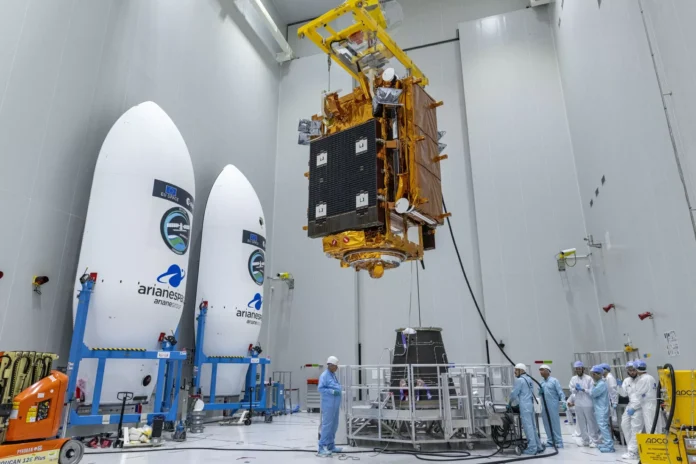European officials have announced that the Vega C rocket is set to make its highly anticipated return to flight next week. Despite a minor technical issue that has delayed the launch of an Earth science satellite by one day, the team is confident that the rocket is ready to soar into the skies once again. This news has been met with great excitement and anticipation from the scientific community and space enthusiasts alike.
The Vega C rocket, developed by the European Space Agency (ESA), is a state-of-the-art launch vehicle designed to carry small to medium-sized payloads into orbit. Its first flight in 2019 was a success, but unfortunately, its second flight in 2020 ended in failure due to a malfunction in the upper stage of the rocket. This setback prompted the ESA to conduct a thorough investigation and make necessary improvements to ensure the safe return of the Vega C rocket.
After months of hard work and dedication, the ESA team has successfully addressed the technical issue and is confident that the rocket is now ready for its return to flight. The launch, which was originally scheduled for next week, has been pushed back by one day to allow for final preparations and checks. This minor delay is a small price to pay for the safety and success of the mission.
The Vega C rocket will be carrying the SEOSAT-Ingenio satellite, a cutting-edge Earth observation satellite developed by the Spanish government and the ESA. This satellite will provide high-resolution images of our planet, helping us better understand and monitor changes in our environment. It will also play a crucial role in disaster management and response, as well as in the fields of agriculture, urban planning, and climate change research.
The return of the Vega C rocket is not only a significant milestone for the ESA but also for the European space industry as a whole. It showcases the ESA’s commitment to continuously improving and advancing its technology, as well as its determination to overcome challenges and setbacks. This determination and resilience are what make the ESA a leader in the global space race.
The success of the Vega C rocket’s return to flight will also have a positive impact on the European economy. The space industry is a major contributor to the European economy, generating billions of euros in revenue and creating thousands of jobs. The successful launch of the Vega C rocket will not only boost the European space industry but also inspire future generations to pursue careers in science, technology, engineering, and mathematics (STEM).
The ESA has also been working closely with its international partners, including NASA and the Japan Aerospace Exploration Agency (JAXA), to ensure the success of the Vega C mission. This collaboration not only strengthens the bonds between nations but also allows for the sharing of knowledge and resources, ultimately leading to groundbreaking discoveries and advancements in space exploration.
The return of the Vega C rocket is a testament to the ESA’s dedication to pushing the boundaries of space exploration and its commitment to using space technology for the betterment of humanity. It is a reminder that despite challenges and setbacks, we must continue to reach for the stars and push the limits of what is possible.
In conclusion, the Vega C rocket’s return to flight next week is a highly anticipated event that will mark a significant milestone for the ESA and the European space industry. The minor delay in the launch is a small price to pay for the safety and success of the mission. We can all look forward to witnessing the Vega C rocket soar into the skies once again and pave the way for future space exploration and discoveries. The future is bright for the ESA, and we can’t wait to see what they will accomplish next.

